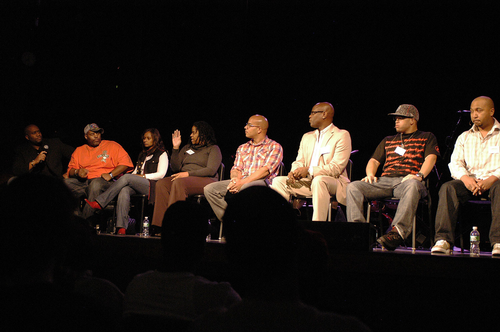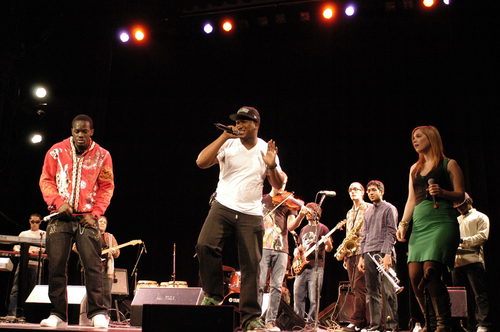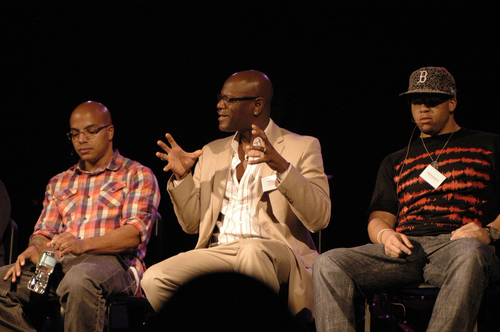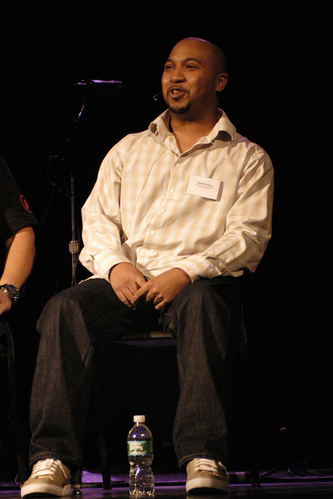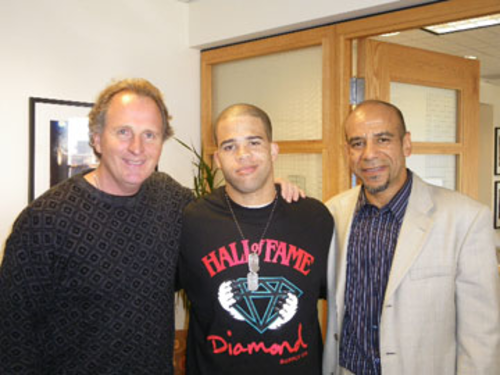Hip-Hop Symposium Tells the Real Story
Berklee commemorated 30-plus years of hip-hop culture and music with its annual Business of Hip-Hop Symposium. In just three years, the daylong symposium has become a highlight of the fall semester, and this year didn't disappoint.
The night's festivities opened with a performance by the J. Dilla Ensemble. The band featured up-and-coming Berklee rapper K.R. Dorsey, who performed a cover of Jay-Z's "Lost One." (A song that was, incidentally, produced by Berklee alumnus and symposium panelist Dawaun Parker and featured on the multiplatinum-selling Kingdom Come album.) The Dilla Ensemble—brainchild of alumnus and current Berklee professor Brian "Raydar" Ellis—teaches the arranging and performance aspects of hip-hop, including instrumentation that ranges from a traditional rhythm section augmented by a horn section to the MPC drum machine and various synthesizers that yield a sound characteristic of the hip-hop idiom.
The panel featured executive vice president of marketing and artist development at Universal Motown Shanti Das, Carlos "Tone Capone" Acosta of Universal Music Group's Coalition Music, former executive editor at XXL Andreas Hale, Berklee Music Production and Engineering professor Prince Charles Alexander, author Thembisa Masheka, and multiplatinum record producer and Berklee alumnus Dawaun Parker, with moderators James "Big Hawk" Hawkins and Berklee alumnus/music executive Michael Trammel.
After preliminary words from professional education dean Darla Hanley, the panel members offered their perspectives on the music industry's past and present as well as challenges facing new artists trying to break in the urban sector. The participants also explored every upperclassman's favorite subject: internships.
Trammel did a grand job of keeping the crowd and panel in both order and stitches. "I remember being in the [music business] office every day when I was a Berklee student, constantly asking 'What can I do?' and 'Where can I go?' It eventually paid off." He weighed in further and rather powerfully via an anecdote: "My first internship was out in a suburb of Massachusetts, a substantial distance from Boston, and I didn't have a car. I went to the end of the public service line and then caught a bus. The only reason the facilitators of the internship found out that I didn't have a car was because I came in soaking wet one day it was raining." He laughed at the memory.
The panelists shared many of their personal experiences with the less glamorous aspects of the music industry—and the potential results. Das commented, "One of the things I can't stand is the attitude of entitlement that I see with a lot of kids these days. If someone asks you to get a cup of coffee, make that your best cup of coffee." Said Alexander, "I recall working as an assistant engineer to a big-name producer and earning a substantial amount of money. To make a long story short, he went cold and I was out of a job. I subsequently went on to offer my services as a house engineer for a studio, where I ended up meeting Sean (P. Diddy) Combs and engineering the Notorious B.I.G.'s Ready to Die."
A welcome addition to this year's symposium was the presence of distinguished female panelists. When a local high school student stood to ask about how a woman could find her way in the often male-dominated world of the hip-hop music business, Das took the bull by the horns, interjecting, "One of the things I would encourage young women to do is respect yourself. When I first came into the industry as an intern, I wore all baggy clothing, because I wanted people to know me for my mind and not other traits."
By sharing such hard-won experience, Das and her fellow panelists gave Berklee students a leg up in a difficult industry.


